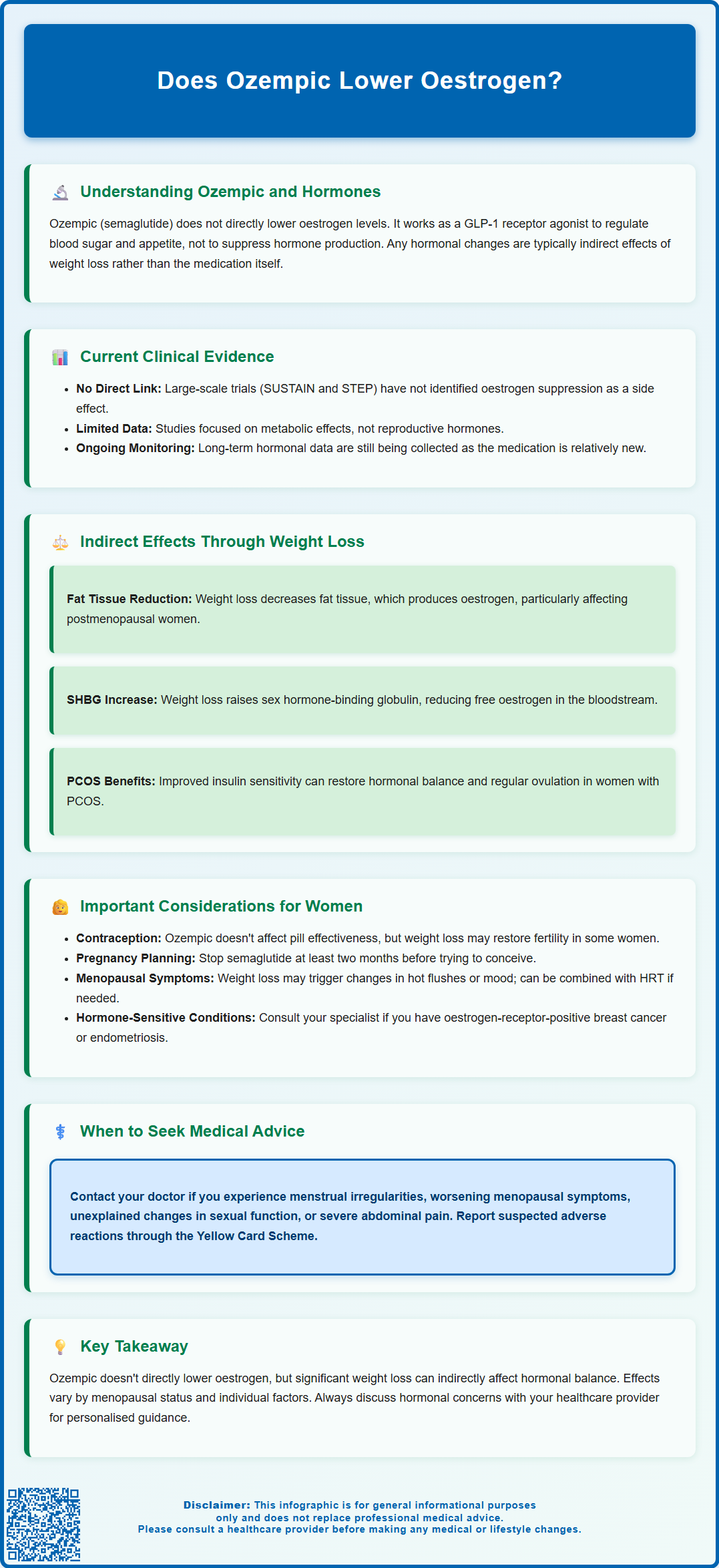Ozempic (semaglutide) is a GLP-1 receptor agonist licensed in the UK for type 2 diabetes and weight management. As prescribing increases, questions have emerged about whether Ozempic directly lowers oestrogen levels. Current evidence shows no established direct mechanism by which semaglutide reduces oestrogen production. However, the substantial weight loss it facilitates can indirectly affect hormonal balance through well-documented metabolic pathways. This article examines the evidence on Ozempic and oestrogen, explores indirect effects mediated through weight loss, and provides guidance for women considering or taking this medication.
Summary: Ozempic (semaglutide) does not directly lower oestrogen levels through its pharmacological action, but significant weight loss from treatment can indirectly affect oestrogen metabolism by reducing adipose tissue where peripheral oestrogen conversion occurs.
- Semaglutide is a GLP-1 receptor agonist licensed for type 2 diabetes and weight management in the UK
- No direct mechanism exists linking semaglutide to reduced oestrogen production at the ovarian level
- Weight loss decreases adipose tissue containing aromatase enzyme, potentially reducing peripheral oestrogen conversion, particularly in postmenopausal women
- Semaglutide does not affect oral contraceptive efficacy and should be discontinued at least two months before planned pregnancy
- Women experiencing menstrual irregularities or severe menopausal symptoms during treatment should seek medical advice for appropriate investigation
Table of Contents
Understanding Ozempic and Hormonal Effects
Ozempic (semaglutide) is a glucagon-like peptide-1 (GLP-1) receptor agonist licensed in the UK for the treatment of type 2 diabetes mellitus and, at higher doses under the brand name Wegovy, for weight management in adults with obesity or overweight with weight-related comorbidities. The medication works by mimicking the action of the naturally occurring hormone GLP-1, which stimulates insulin secretion in a glucose-dependent manner, suppresses glucagon release, slows gastric emptying, and reduces appetite through central nervous system pathways.
As GLP-1 receptor agonists have become increasingly prescribed, questions have emerged regarding their potential effects on sex hormones, particularly oestrogen. Patients and healthcare professionals alike have sought clarity on whether semaglutide directly influences oestrogen production or metabolism. Understanding the distinction between direct pharmacological effects and indirect consequences of treatment is essential for informed clinical decision-making.
There is currently no established direct mechanism by which semaglutide would lower oestrogen levels through its primary pharmacological action. The evidence regarding GLP-1 receptor pathways and their influence on reproductive tissues and ovarian function remains limited. However, the substantial metabolic changes that occur with semaglutide treatment—particularly significant weight loss—can indirectly affect hormonal balance in complex ways. This article examines the current evidence regarding Ozempic and oestrogen levels, explores the indirect effects mediated through weight loss, and provides guidance for women considering or currently taking this medication.

Current Evidence on Ozempic and Oestrogen Levels
Clinical trial data and post-marketing surveillance have not identified direct suppression of oestrogen as a recognised adverse effect of semaglutide. The Summary of Product Characteristics (SmPC) approved by the Medicines and Healthcare products Regulatory Agency (MHRA) does not list alterations in oestrogen levels amongst the documented side effects of Ozempic. The large-scale randomised controlled trials, including the SUSTAIN and STEP programmes, were not specifically designed to assess sex hormone profiles as outcomes, and there is no signal of a direct oestrogen-lowering effect to date.
Laboratory studies examining the mechanism of action of GLP-1 receptor agonists have focused predominantly on metabolic pathways, insulin sensitivity, and cardiovascular outcomes rather than reproductive endocrinology. There is no official link established between semaglutide administration and reduced oestrogen production at the ovarian level. The GLP-1 receptor is expressed in various tissues throughout the body, including the pancreas, gastrointestinal tract, cardiovascular system, and central nervous system, but its potential role in reproductive tissues remains an area requiring further investigation.
It is important to note that absence of evidence is not evidence of absence. Whilst current data do not support a direct oestrogenic effect, the medication has only been in widespread clinical use for a relatively short period. Long-term observational studies and real-world evidence continue to accumulate. Healthcare professionals should remain vigilant for emerging safety signals and encourage patients to report any unexpected symptoms through the Yellow Card Scheme operated by the MHRA. Any concerns regarding hormonal changes should be investigated appropriately with baseline and follow-up hormone measurements where clinically indicated.
Indirect Effects: Weight Loss and Oestrogen Changes
Whilst semaglutide does not directly lower oestrogen, the substantial weight loss it facilitates can significantly influence oestrogen metabolism and circulating levels through well-established physiological mechanisms. Adipose tissue functions as an endocrine organ and is a major site of oestrogen production in postmenopausal women and, to a lesser extent, in premenopausal women. The enzyme aromatase, present in fat cells, converts androgens to oestrogens—a process that becomes increasingly important after menopause when ovarian oestrogen production declines.
When individuals lose significant amounts of body fat through semaglutide treatment, the total mass of aromatase-containing tissue decreases, potentially reducing peripheral oestrogen conversion. In postmenopausal women, this may lead to measurable decreases in circulating oestrogen levels. For premenopausal women with regular ovulatory cycles, the ovaries remain the primary source of oestrogen, so the impact of fat loss on total oestrogen levels may be less pronounced, though changes in oestrogen metabolism and distribution can still occur. The magnitude of these effects varies considerably based on menopausal status and individual factors.
Additionally, weight loss improves insulin sensitivity and reduces chronic inflammation, both of which can affect the hypothalamic-pituitary-ovarian axis. In women with polycystic ovary syndrome (PCOS), weight reduction often restores more regular ovulation and can normalise the elevated androgen-to-oestrogen ratio characteristic of this condition. Paradoxically, whilst total oestrogen might decrease with fat loss, the hormonal profile may become more balanced and physiologically appropriate.
Sex hormone-binding globulin (SHBG) levels typically increase with weight loss and improved metabolic health. Higher SHBG concentrations reduce the proportion of free, biologically active oestrogen and testosterone in circulation, which can influence symptoms and physiological effects even when total hormone levels remain unchanged.
Considerations for Women Taking Ozempic
Women considering or currently taking semaglutide should be aware of several important considerations related to hormonal health and reproductive function. According to the Ozempic and Wegovy SmPCs, semaglutide has no clinically relevant effect on the exposure of oral contraceptives containing ethinylestradiol and levonorgestrel. Additional contraception is not routinely required solely due to semaglutide use. However, if vomiting or severe diarrhoea occurs, standard missed-pill advice should be followed.
For women of childbearing potential, it is crucial to note that weight loss itself can restore fertility in those with obesity-related anovulation. Women who have experienced difficulty conceiving due to weight-related factors may find their fertility improves during semaglutide treatment, necessitating reliable contraception if pregnancy is not desired. Semaglutide should be discontinued at least two months before a planned pregnancy. If pregnancy occurs during treatment, semaglutide should be stopped immediately and medical advice sought promptly. Semaglutide is not recommended during breastfeeding due to limited safety data.
Menopausal symptoms may be influenced by changes in body composition and oestrogen metabolism. Some women report changes in vasomotor symptoms (hot flushes), mood, or other oestrogen-related effects during significant weight loss. These changes are generally attributable to the metabolic transformation rather than direct drug effects. Women experiencing troublesome menopausal symptoms should discuss hormone replacement therapy (HRT) options with their GP or specialist. There are no known interactions between HRT and semaglutide, and they can be co-prescribed when clinically appropriate.
Women with a history of hormone-sensitive conditions, such as oestrogen-receptor-positive breast cancer or endometriosis, should have individualised discussions with their oncologist or specialist before starting semaglutide. Whilst there is no evidence that semaglutide adversely affects these conditions, the hormonal changes associated with significant weight loss warrant careful consideration in this population.
When to Seek Medical Advice
Patients taking Ozempic should maintain regular contact with their healthcare team and seek medical advice if they experience symptoms that might indicate hormonal imbalance or other significant adverse effects. Menstrual irregularities warrant investigation, particularly if previously regular cycles become significantly disrupted or if unexpected bleeding occurs. Whilst some cycle changes may accompany weight loss, persistent irregularities should be evaluated to exclude other causes such as thyroid dysfunction, hyperprolactinaemia, or structural abnormalities.
Women should contact their GP or specialist if they develop severe or persistent symptoms potentially related to oestrogen changes, including:
-
Significant worsening of menopausal symptoms (hot flushes, night sweats, mood changes)
-
Vaginal dryness or discomfort affecting quality of life
-
Unexplained changes in libido or sexual function
-
Symptoms suggestive of bone health concerns (unexplained fractures, significant height loss)
-
Mood disturbances or depressive symptoms
Seek urgent medical attention if you experience:
-
Severe, persistent abdominal pain (especially radiating to the back) with or without vomiting, which could indicate pancreatitis
-
Upper right abdominal pain, fever, or yellowing of the skin/eyes, which might suggest gallbladder disease
-
Signs of dehydration (extreme thirst, dry mouth, reduced urination, dizziness)
-
Suspected pregnancy while taking semaglutide
Routine monitoring during semaglutide treatment should follow NICE guidance for diabetes management or weight management programmes. This typically includes assessment of glycaemic control, cardiovascular risk factors, and treatment tolerability. Hormone levels are not routinely measured unless clinically indicated by specific symptoms or concerns.
Any suspected adverse drug reactions should be reported through the Yellow Card Scheme, accessible via the MHRA website or the Yellow Card app. Patients experiencing serious or unexpected side effects should seek prompt medical attention and should not discontinue prescribed medication without professional guidance, as abrupt cessation may affect glycaemic control in those with diabetes.
Frequently Asked Questions
Can Ozempic affect my menstrual cycle?
Ozempic does not directly affect menstrual cycles, but the weight loss it facilitates can influence hormonal balance and restore ovulation in women with obesity-related anovulation. Persistent menstrual irregularities should be evaluated by your GP to exclude other causes.
Do I need extra contraception whilst taking Ozempic?
Semaglutide does not reduce the effectiveness of oral contraceptives, so additional contraception is not routinely required. However, weight loss may restore fertility in women with obesity-related anovulation, so reliable contraception is important if pregnancy is not desired.
Can I take HRT alongside Ozempic?
Yes, there are no known interactions between hormone replacement therapy (HRT) and semaglutide, and they can be co-prescribed when clinically appropriate. Women experiencing troublesome menopausal symptoms during Ozempic treatment should discuss HRT options with their GP.
The health-related content published on this site is based on credible scientific sources and is periodically reviewed to ensure accuracy and relevance. Although we aim to reflect the most current medical knowledge, the material is meant for general education and awareness only.
The information on this site is not a substitute for professional medical advice. For any health concerns, please speak with a qualified medical professional. By using this information, you acknowledge responsibility for any decisions made and understand we are not liable for any consequences that may result.
Heading 1
Heading 2
Heading 3
Heading 4
Heading 5
Heading 6
Lorem ipsum dolor sit amet, consectetur adipiscing elit, sed do eiusmod tempor incididunt ut labore et dolore magna aliqua. Ut enim ad minim veniam, quis nostrud exercitation ullamco laboris nisi ut aliquip ex ea commodo consequat. Duis aute irure dolor in reprehenderit in voluptate velit esse cillum dolore eu fugiat nulla pariatur.
Block quote
Ordered list
- Item 1
- Item 2
- Item 3
Unordered list
- Item A
- Item B
- Item C
Bold text
Emphasis
Superscript
Subscript










